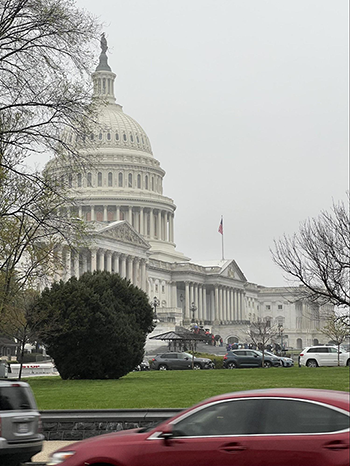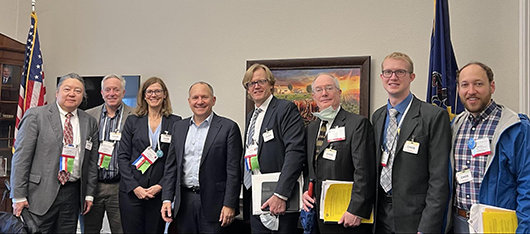In brief:
- The Academy, the American Medical Association and more than 100 other physician organizations object to how the Veterans Health Administration is developing national standards of practice for more than 40 categories of health professionals, rules that would supersede established state laws governing scope of practice and health-professional licensure.
- Watch your inbox for a message from the Academy, alerting us when the VA national standards are filed. The Academy will explain the implications of the standards and provide guidance on what we can do to be heard.
My first-ever visits to federal lawmakers’ offices — during the Academy’s Congressional Advocacy Day on April 7 — underscored the importance of bringing our voice to Capitol Hill. As I went from office to office with the Pennsylvania contingent, none of the representatives or staffers we spoke with were familiar with the Veterans Health Administration’s Federal Supremacy Project, an issue that could have broad ramifications for our patients’ safety.
I went to Capitol Hill with hundreds of other ophthalmologists to advocate for our patients. In addition to the VA project, we discussed topics including barriers to safe and efficient patient care, such as prior authorization and step therapy requirements, and lobbied for increasing federal funding for vision-related research.
We’re all passionate about protecting our patients — in the clinic setting and in the health policy arena. I obtained a master's degree in public health from the Tulane University School of Public Health and Tropical Medicine to learn more about epidemiology and the systems involved in delivering health care to populations and to gain experience with statistical methods and study design. I also have volunteered with Doctors Without Walls: Santa Barbara Street Medicine and a group called Aeromedicos. Both organizations have a mission of bringing health care services directly to patients, and my time with these organizations inspired me to learn more about public health.
With that background, I shared with lawmakers why I am so concerned about the VA Federal Supremacy Project because of what it could mean for veterans’ eye care.
In 2020, the VA published an interim final rule that confirms its “authority to establish national standards of practice for health care professionals which will standardize a health care professional's practice in all VA medical facilities.” In this statement, the VA also confirms that within its system these national standards of practice would supersede any conflicting state laws regulating a health care professional’s licensure and scope of practice.
The American Optometric Association and the Armed Forces Optometric Association support the new rule, stating in a letter to the VA that they “encourage VA to use the process to ensure veteran patients have unfettered access to the full range of services, including therapeutic laser eye procedures, that America’s doctors of optometry are trained and licensed to provide.”
The Academy along with the American Medical Association and nearly 100 other physician groups wrote to Secretary of Veterans Affairs Denis McDonough last year to express concerns with the project, including lack of transparency regarding how the national standards of practice would be determined, and concerns that these standards will not adequately account for differences in education and training between physicians and surgeons and non-physician providers.
The VA soon will be publishing the national standards in the Federal Register. Thanks to the efforts of the Academy and the other physician groups, the standards then will be subject to a 60-day comment period, a high-stakes opportunity for us to weigh in.
At Mid-Year Forum 2022, Academy President Robert Wiggins, MD, encouraged us to show up, stand up, and speak up for our patients. Act now to make your voice heard!
How to get involved
- Watch your inbox for a message from the Academy, alerting us when the VA national standards are filed. The Academy will explain the implications of the standards and provide guidance on what we can do to be heard.
- Join and participate in your state ophthalmology and medical societies
- Attend the Academy’s Congressional Advocacy Day and Mid-Year Forum in 2023
- Join OPHTHPAC. The Academy's non-partisan political action committee helps candidates and elected leaders.
- Donate to the Surgical Scope Fund. Through the fund, the Academy works with state ophthalmological and medical societies to ensure patient safety and surgical standards.
 |
|
Visiting the Capitol on AAO’s Congressional Advocacy Day (photo courtesy of Zachary Koretz).
|
 |
|
Pennsylvania ophthalmologists meet with Rep. Lloyd Smucker (R-PA 11th District) on Capitol Hill. From left to right: Dr. Kenneth Cheng, Dr. David Silbert, Dr. Sharon Taylor, Rep. Lloyd Smucker, Dr. Robert Bergren, Dr. Herbert Ingraham, Dr. David Rosen, Dr. Zachary Koretz (photo courtesy of Zachary Koretz).
|
References:
- Federal Register. Authority of VA professionals to practice health care. Accessed April 10, 2022. https://www.federalregister.gov/documents/2020/11/12/2020-24817/authority-of-va-professionals-to-practice-health-care
- Federal Register. Comment on AQ94-Interim Final Rule-Comment Submission. Accessed April 10, 2022. https://www.regulations.gov/comment/VA-2020-VHA-0024-12767
About the Author
 |
Zachary Koretz, MD, MPH is a PGY-4 ophthalmology resident at the University of Pittsburgh in Pittsburgh. He will be starting a vitreoretinal surgery fellowship at the Shiley Eye Institute at the University of California San Diego in July. |